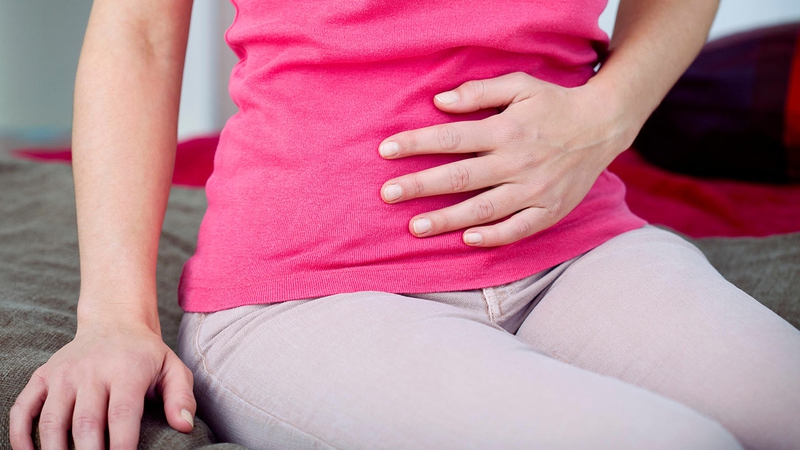Menopause and bloating? Yes! As you approach your menopause, you may experience a feeling of tightness and an uncomfortable fullness in your tummy and abdomen. This is commonly called bloating. It can last for a few hours or even a couple of days. It often comes with a need to burp and break wind, which is called flatulence. If you have often experienced pre-menstrual tension (PMS) before your periods, you are more likely to suffer from this condition. Here you will get the possible causes behind this and what you can do to avoid it.

Why Does Menopause Cause Bloating?
Between the ages of 45 to 55 a woman’s body starts preparing for her menopause. The most dramatic changes happen in the levels of hormones in the system, which can cause bloating, combined with other factors.
Estrogen. An increase in the level of this hormone causes the body to retain water which is the main cause of bloating. During menopause, the hormone levels bounce up and down which increases the times one feels bloated and also how long the feeling lasts.
Constipation. On the other hand, a low level of estrogen causes less production of bile. Bile keeps the small intestine moist and allows us to expel fecal matter comfortably when we go to the loo. Less bile in the body will cause constipation which increases the feeling of bloating.
Flatulence. Less bile also alters the way your body digests fat and this causes excess “gas” which increases the pressure of bloating in menopause.
Gaining weight. Another hormonal change is an increase in androgen. This results in the body turning calories into fat instead of energy. So, in menopause, women tend to store fat around the abdomen which also increases bloating. Women who have undergone a hysterectomy are more likely to have problems with weight gain.
Side effects of hormone replacement therapy (HRT). Bloating is a possible side effect of having HRT during the years before your menopause.
How to Relieve Bloating During Menopause
Changes in dietary habits
As you can see from the above, excessive “gas” is a common cause and the following dietary changes will help you reduce gas.
Drink more water. You should flush out your system with at least 6 to 8 glasses a day. Even one glass of water will relieve the sense of being bloated.
Five small meals a day are better for you than fewer large meals. This will stimulate your metabolism and help you control your weight.
Eat whole grain rather than refined pasta, bread and rice.
Avoid adding salt to your food. Many products already have salt added during the manufacturing process. You should make sure you taste food before adding salt.
Reduce trigger foods. Unfortunately some foods cause a lot of gas when they are being digested. These include onions, soft cheeses, broccoli, beans, oats, cauliflower, potatoes, sprouts and worst of all; fizzy (carbonated) drinks!
Luckily there are also delicious foods that actually reduce gas, for example, peanut butter, hard cheeses, grapes, watercress, eggs, cucumbers, yogurt and watermelon.
Avoid alcohol and drink decaffeinated tea and coffee.
Control your food intake to keep your weight down. Don’t be tempted to crash diet. Your body is already coping with a great number of changes due to your menopause.
Changes in lifestyle
One change your body would welcome is if you stop smoking. This will decrease your estrogen level, help lesson bloating during your menopause and help you control your weight.
Stress always makes problems seem worse. In order to reduce the chance of discomfort because of menopause and bloating, it is important you explore ways to avoid stressful situations. Exercising, yoga, and meditation can be very useful in this regard.
Natural remedies
There are many safe and easily available remedies that work very well in relieving bloating during menopause.
Herbal teas. Ginger and green teas are both excellent, so is the tea made with fennel. Loose tea is preferable to tea bags. And remember to avoid black tea.
Bicarbonate of Soda (Baking powder). Use a drink of this to neutralize gas. The carbon dioxide it contains will produce a burp that relieves the bloated feeling.
Mints. Peppermints and spearmints can provide relief.
Pepper. Black and Cayenne pepper are both natural cures. These can be added to food as seasoning and a small pinch can be added to herbal drinks as well.
Daily Exercises
This is probably the best remedy of all for bloating during menopause and will help improve you overall wellbeing.
Exercising against resistance. This means working your muscles against your own body weight, like press-ups or using free weights, or even better, using one of those exercise bands (Thera-bands). This kind of exercise will help you build up your core muscles and the perspiration will help you lose salt.
Doing yoga is the very best exercise. Many stretches help move gas around and out of your body. Exercise and yoga can also help you cope with the mood swings and hot flashes that happen as you approach menopause and for several years afterwards.
Other simple tips to help you expel gas to relieve bloating include taking a quick walk; massaging your stomach; lying comfortably on your back and bringing your knees up to your chest a few times.
Last Words
The end of menstruation is not the end of your life and it should bring you many happy years of freedom. So don’t let it be spoilt by menopause and bloating. However, if you find that the bloating is getting worse or lasting longer despite the things you do to improve the situation, you must go and see your healthcare professional or visit your nearest clinic. In some cases, it could be an indication of some other ailment which requires different treatment.
View All Comments /Add Comment